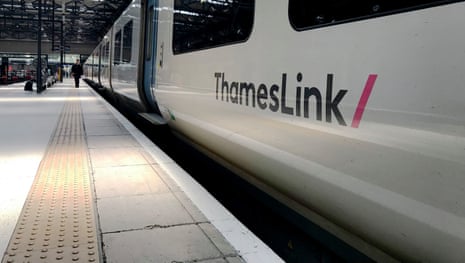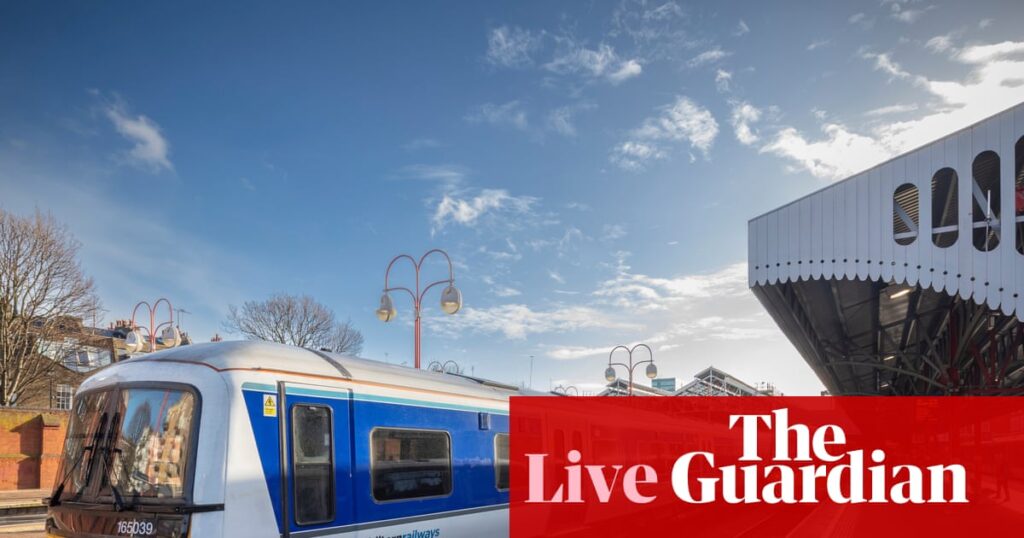Majority of trains under public control by next year, transport secretary to announce
Most rail journeys in Great Britain will be under public ownership by the middle of next year, the transport secretary is expected to announce.
Speaking at the Labour party’s annual party conference, Heidi Alexander will reveal the next four services to be brought into public ownership.
In her speech, Alexander is expected to say:
For too long our railways have been run in the interests of private profit, under a broken system that failed passengers over and over again.
This Labour government is calling time on 30 years of failure, frustration, fragmentation. We are returning our railways to the service of passengers.
In February next year, West Midlands Trains will become the next operator to transfer into public ownership.
And today I can go further, and announce that Govia Thameslink Railway, Chiltern Railways, and Great Western Railway will follow.
We said we would do it in our manifesto – and we are delivering on our promise.
West Midlands Trains services will transfer on 1 February 2026 and Govia Thameslink Railway’s services on 31 May 2026. Chiltern Railways and Great Western Railways (GWR) services will then be the next to transfer.

Govia Thameslink is the largest train operator in the country, meaning that by the middle of next year eight in ten services will be run by the public, for the public, say Labour.
Legislation to establish Great British Railways, the new organisation which will take responsibility for the day-to-day operations of the railways, will be introduced before the end of the year, the party has said.
More on this story in a moment, but first, here is what else is on the schedule today:
-
Morning: Children and families minister Josh MacAlister is on the morning media round.
-
11.30am: Keir Starmer will make a visit in central Liverpool as he heads to the city for his party’s conference.
-
12pm: Palestine Solidarity Campaign protest expected outside Labour party conference.
-
3.20pm: Chancellor Rachel Reeves will visit Southport.
-
Saturday: Close of constituency Labour party (CLP) and affiliate nominations for Labour deputy leadership candidates.
And some of the other recent developments in UK politics:
-
Keir Starmer will warn the Labour party that it is in a “fight for the soul of the nation” and that history will not forgive his government if it fails to confront and defeat Reform UK and the populist right. Speaking to the Guardian ahead of a vital conference for his leadership, he said he would tell disgruntled party members that now was “not the time for introspection” and infighting.
-
Starmer’s plan for digital IDs risks creating “an enormous hacking target”, a cybersecurity expert has warned, as technology companies prepared to bid for contracts that could run into billions of pounds. Amid widespread opposition, the prime minister said the mandatory digital ID – including citizens’ photos, names, dates of birth, nationalities and residency status – would come into use by July 2029. A petition calling for the government not to introduce digital ID cards had received more than 1.5 million signatures by Saturday morning.
-
Labour has restored the party whip John McDonnell and Apsana Begum 14 months after they lost it for rebelling over the two-child benefit cap, the Guardian understands. The pair had the whip reinstated after a conversation on Friday with Jonathan Reynolds, who became Labour’s chief whip in a reshuffle earlier this month.
-
Fears are growing that shared houses may become the focus of anti-migrant protests, with residents and charities saying tensions are building in some areas. Homes of multiple occupation (HMOs) have grown in number as renters seek affordable accommodation amid a housing crisis. Reform UK politicians, including George Finch, the teenage leader of Warwickshire county council, have criticised the use of HMOs to house asylum seekers.
Key events
Starmer asks Conservative peer to write planning bill to block judicial reviews

Helena Horton
Keir Starmer has tasked a Conservative peer with writing a new planning bill to remove the ability for environmental groups to delay projects such as Heathrow’s third runway with judicial reviews.
The Guardian understands that leaving the Aarhus convention is being discussed as an option. This is an international treaty signed up to by the EU and other countries in Europe, which protects the right for campaigners to bring legal claims against large infrastructure projects such as waste plants, nuclear power stations and motorways.
Doing this would “destabilise Britain’s constitution” and silence legitimate objections, leading planning lawyers have warned.
The chancellor, Rachel Reeves, has put Heathrow expansion at the heart of her push for economic growth, claiming it would make the UK “the world’s best-connected place to do business”. The Treasury sees the new bill – including blocking what one source close to Reeves called “stupid” judicial review cases for nationally significant infrastructure projects – as essential to ensuring work can start on a new runway before the next general election.
Reeves has repeatedly complained that the protection of “bats and newts” has interfered with the UK’s ability to complete major infrastructure projects. She has also insisted that pursuing economic growth must trump Labour’s net zero commitments, saying “growth underpins everything else”.
Starmer and Reeves earlier this year introduced a planning bill to parliament that would override EU-derived environmental protections and put important wildlife sites at risk of development. After campaigns by activists and MPs, the government added amendments that gave some extra protections for nature. But ministers still believe deregulation has not gone far enough.
Charles Banner KC has been asked by the prime minister to find a way to remove the cap on costs for groups bringing a judicial review. He has previously worked on human rights cases with Starmer, and is considered an expert on judicial reviews. He has worked on cases involving Heathrow and Stansted airports, as well as Thames Water’s Abingdon reservoir.

Alfie Packham
Keir Starmer has announced plans for a digital ID system, which will become mandatory as a means of proving the right to work in the UK.
From concerns around civil liberties and cybersecurity to a helpful system to streamline services in line with other European countries’ existing ID schemes, eight people share their views here:
Here are some images coming in via the newswires as Keir Starmer and other Labour politicians head to Liverpool for the party’s annual conference.
The conference runs from 28 September to 01 October at the Arena convention centre.
Education secretary says 500,000 more children in England will soon benefit from government’s free breakfast scheme
Hundreds of thousands more children are to receive a free breakfast through a government scheme, Bridget Phillipson has announced.
On Saturday, education secretary, said that 500,000 more children across England will soon benefit from the government’s role out of free breakfast clubs
Reaching half a million more children and backed by £80m of investment, about 2,000 new schools will join the free breakfast club scheme next year, Labour said. Funded by the existing spending review settlement, it is part of Labour’s plan for change.
Phillipson said:
The start of the national rollout of free breakfast clubs will be an historic change in working families’ daily routines and is another example of this Labour government making good on its promises to deliver the change the British people voted for.
This is Labour choosing a path of renewal towards a fairer country – breaking down the barriers to opportunity and ensuring every child starts school ready to learn.
Through our plan for change, Labour is rolling out free breakfast clubs and school-based nurseries to make working parents’ lives easier and give all children the best start in life.
Further details on the rollout of the breakfast clubs programme will follow in the autumn, said Labour.
Scottish Greens are hoping to return their first-ever constituency MSP in next year’s Holyrood election – with the party targeting the seat currently held by former first minister Nicola Sturgeon, reports the PA news agency.
Local councillor Holly Bruce has been selected as the Green candidate to fight the Glasgow Southside constituency – which Sturgeon has represented since 2011. It comes as the former SNP leader prepares to step down from Holyrood after being an MSP since the devolved assembly began in 1999.
Greens hope her departure will boost their campaign, allowing them to return their first ever constituency MSP. Under Holyrood’s proportional representation system, all of the Green MSPs so far have been elected via the regional list.
Having been selected as the candidate, Bruce said she was “excited to be the Scottish Green voice in the Southside constituency”. She said:
I have worked hard as a councillor for Langside for the past three years to build a better community and now I can’t wait to be the voice of change across our great communities in the constituency.
Bruce added that Greens are “standing to make a change for the people of Southside and for Scotland”.
She told voters in the area:
As your candidate for Glasgow Southside, I will always put people and planet before corporate greed, I will fight back against the millionaires who are pushing racist anti-migrant narratives and I will call out the horrific genocide in Gaza.
Patrick Harvie, former Scottish Green co-leader and the party’s longest-serving MSP, said Bruce had “achieved one of the best-ever results for the Greens in Glasgow, winning her council ward on first preferences in 2022”. He added:
Since then, she’s been a great voice for the local community and I have no doubt that she’ll be a fantastic candidate for the constituency.
Green support in Glasgow Southside has been growing steadily in recent years and we’re looking forward to the campaign for Holyrood, in Southside, across Glasgow and throughout the country.
Ahead of Labour party conference, backbench MPs and unions have renewed calls to end the two-child benefit cap.
Several MPs from Liverpool, the host city of the conference, were among those who wrote to the prime minister ahead of the gathering insisting the cap “is one of the most significant drivers of child poverty in Britain today”, reports the PA news agency.
Debate over the future of the cap is among a number of areas of benefits policy where ministers could be challenged by Labour members in Liverpool. Among those who have previously called for it to go is Lucy Powell, the former House of Commons leader who is the frontrunner in the race to become the next Labour deputy leader.
Labour MPs forced a U-turn on Keir Starmer’s plans to cut the benefits bill earlier this year. But in a hint that ministers are willing to return to the battle, Darren Jones, the prime minister’s chief secretary and a senior Cabinet Office minister, told the Telegraph that the benefits bill is “unsustainable in the long run”.
Starmer’s plans for a new digital ID system, announced at a conference of centre-left leaders in London on Friday, will also likely face scrutiny at the conference.
Senior Labour figures are meanwhile expected to set out the details of a fresh tranche of “new towns” at the event, reports the PA news agency.
Labour restores whip to two more child-benefit cap rebels

Peter Walker
Labour has restored the party whip John McDonnell and Apsana Begum 14 months after they lost it for rebelling over the two-child benefit cap, the Guardian understands.
The pair had the whip reinstated after a conversation on Friday with Jonathan Reynolds, who became Labour’s chief whip in a reshuffle earlier this month.
After the decision, Begum said she would “continue to expose the two-child limit at every opportunity”.
“Child poverty is a matter of conscience for me: 44.6% of children in my constituency live in poverty,” she said. “Calls to scrap the policy are growing, from the children’s commissioner to members of the government’s own child-poverty taskforce.”
McDonnell and Begum were among seven MPs to lose the whip in July last year for supporting an amendment to the king’s speech calling for an end to the cap, which has been blamed for a rise in child poverty.
Four of the other MPs suspended at the time, Rebecca Long-Bailey, Ian Byrne, Imran Hussain and Richard Burgon, had the whip restored in February.
The last of the seven, Zarah Sultana, has cut ties with the party and is attempting to launch a new leftwing party alongside Jeremy Corbyn, who was re-elected in 2024 election as an independent.
Anti-migrant activists may target rental homes, charities warn

Jessica Murray
Fears are growing that shared houses may become the focus of anti-migrant protests, with residents and charities saying tensions are building in some areas.
Homes of multiple occupation (HMOs) have grown in number as renters seek affordable accommodation amid a housing crisis.
Defined as a property where three or more tenants live with shared facilities, HMOs are most often used to house students, young professionals, asylum seekers or, increasingly, anyone on a tight budget.
Messages have been posted on social media urging action against HMOs thought to be housing asylum seekers, with some individuals trying to compile lists of addresses.
A former pub on the edge of Warrington in Cheshire was daubed with graffiti last month saying “No HMOs” after rumours it was due to be converted. The local council said it had not received any planning application.
Reform UK politicians, including George Finch, the teenage leader of Warwickshire county council, have criticised the use of HMOs to house asylum seekers.
Protests led by the far right over the summer have been blamed in part on inaccurate and inflammatory claims from politicians including Nigel Farage, the leader of Reform, and Robert Jenrick, the shadow justice secretary.
The Home Office has promised to close dozens of asylum hotels in the new year with ministers due to unveil plans to move asylum seekers into military barracks instead.
But there has been growing speculation about whether they could, or should, resort to a greater use of HMOs which – separately from the asylum debate – have been blamed for tensions in some communities.
Louise Calvey of Asylum Matters, which campaigns for better asylum conditions in the UK, said the charity had received reports of an increase in hate crimes near HMOs as well as rumours circulating in communities that HMOs were housing migrants, even if they were not.
More than 1.6m sign petition opposing Starmer’s plan for digital ID cards
Kyriakos Petrakos
More than 1.6 million people have signed a petition opposing the introduction of digital ID cards after Keir Starmer announced plans to make them mandatory for people working in the UK by 2029.
The petition says “no one should be forced to register with a state-controlled ID system”, which it describes as a “step towards mass surveillance and digital control”.
Petitions that receive more than 100,000 signatures are considered for a debate in parliament, but there is little evidence of their success in shaping government policy. More than 6 million people signed one calling for Brexit to be reversed.
Digital ID cards presented “an enormous opportunity” for the UK, Starmer said on Friday, as the government grappled with a civil liberties row over the proposals.
The prime minister said:
I know working people are worried about the level of illegal migration into this country. A secure border and controlled migration are reasonable demands, and this government is listening and delivering.
Digital ID is an enormous opportunity for the UK. It will make it tougher to work illegally in this country, making our borders more secure.
He argued that the “Brit card” would offer ordinary citizens “countless benefits, like being able to prove your identity to access key services swiftly – rather than hunting around for an old utility bill”.
Civil liberties groups have raised concerns over the proposals, with Silkie Carlo, the director of Big Brother Watch, warning the system would “make Britain less free” and create “a domestic mass surveillance infrastructure that will likely sprawl from citizenship to benefits, tax, health, possibly even internet data and more”.
Speaking to the Times, the chancellor said she wanted the Office for Budget Responsibility (OBR) to include the improved EU trading relationship brokered by Labour when it makes economic forecasts.
According to the PA news agency, she also told the newspaper the government wants “an ambitious youth experience scheme” to be scored by the OBR, as it would also be “good for the economy, good for growth and good for business”.
The scheme would allow young people from the UK to work, study and live on the continent, and vice versa, for an extended period of time.
While Reeves was keen to stress the economic benefits of the scheme, the Times suggested it could lead to a new migration headache for the government, as 50,000 Europeans a year could be eligible to live in the UK as a result of it.
Labour party chair Anna Turley has told the PA news agency she did not think “anyone would deny” that her party has had “quite a challenging couple of weeks” amid calls for Andy Burnham to challenge the prime minister.
But she insisted that many more MPs are “frustrated” that their colleagues are already trying to topple Starmer.
Keir Starmer to warn Labour that battle with Reform is ‘fight for soul of the nation’

Pippa Crerar
Keir Starmer will warn the Labour party that it is in a “fight for the soul of the nation” and that history will not forgive his government if it fails to confront and defeat Reform UK and the populist right.
Speaking to the Guardian ahead of a vital conference for his leadership, he said he would tell disgruntled party members that now was “not the time for introspection” and infighting.
His remarks are likely be seen as a veiled dig at Andy Burnham, the mayor of Greater Manchester, who has been touted by some as a potential successor.
The prime minister heads to Liverpool after a rocky few weeks marked by missteps and departures, and with Labour lagging 10 points behind Reform in the polls.
In his interview, Starmer urged his party to recognise the scale of the challenge ahead.
He said:
I have to say to all of those attending conference, this is a real opportunity for us to make our argument about patriotic national renewal, to own patriotism, to define it for what it is.
History will not forgive us if we do not use every ounce of our energy to fight Reform. There is an enemy. There is a project which is detrimental to our country. It actually goes against the grain of our history. It’s right there in plain sight in front of us. We have to win this battle.
While Starmer’s focus will be on setting out his own vision for renewing the country, he will also urge Labour not to be distracted by speculation over his grip on power.
Majority of trains under public control by next year, transport secretary to announce
Most rail journeys in Great Britain will be under public ownership by the middle of next year, the transport secretary is expected to announce.
Speaking at the Labour party’s annual party conference, Heidi Alexander will reveal the next four services to be brought into public ownership.
In her speech, Alexander is expected to say:
For too long our railways have been run in the interests of private profit, under a broken system that failed passengers over and over again.
This Labour government is calling time on 30 years of failure, frustration, fragmentation. We are returning our railways to the service of passengers.
In February next year, West Midlands Trains will become the next operator to transfer into public ownership.
And today I can go further, and announce that Govia Thameslink Railway, Chiltern Railways, and Great Western Railway will follow.
We said we would do it in our manifesto – and we are delivering on our promise.
West Midlands Trains services will transfer on 1 February 2026 and Govia Thameslink Railway’s services on 31 May 2026. Chiltern Railways and Great Western Railways (GWR) services will then be the next to transfer.
Govia Thameslink is the largest train operator in the country, meaning that by the middle of next year eight in ten services will be run by the public, for the public, say Labour.
Legislation to establish Great British Railways, the new organisation which will take responsibility for the day-to-day operations of the railways, will be introduced before the end of the year, the party has said.
More on this story in a moment, but first, here is what else is on the schedule today:
-
Morning: Children and families minister Josh MacAlister is on the morning media round.
-
11.30am: Keir Starmer will make a visit in central Liverpool as he heads to the city for his party’s conference.
-
12pm: Palestine Solidarity Campaign protest expected outside Labour party conference.
-
3.20pm: Chancellor Rachel Reeves will visit Southport.
-
Saturday: Close of constituency Labour party (CLP) and affiliate nominations for Labour deputy leadership candidates.
And some of the other recent developments in UK politics:
-
Keir Starmer will warn the Labour party that it is in a “fight for the soul of the nation” and that history will not forgive his government if it fails to confront and defeat Reform UK and the populist right. Speaking to the Guardian ahead of a vital conference for his leadership, he said he would tell disgruntled party members that now was “not the time for introspection” and infighting.
-
Starmer’s plan for digital IDs risks creating “an enormous hacking target”, a cybersecurity expert has warned, as technology companies prepared to bid for contracts that could run into billions of pounds. Amid widespread opposition, the prime minister said the mandatory digital ID – including citizens’ photos, names, dates of birth, nationalities and residency status – would come into use by July 2029. A petition calling for the government not to introduce digital ID cards had received more than 1.5 million signatures by Saturday morning.
-
Labour has restored the party whip John McDonnell and Apsana Begum 14 months after they lost it for rebelling over the two-child benefit cap, the Guardian understands. The pair had the whip reinstated after a conversation on Friday with Jonathan Reynolds, who became Labour’s chief whip in a reshuffle earlier this month.
-
Fears are growing that shared houses may become the focus of anti-migrant protests, with residents and charities saying tensions are building in some areas. Homes of multiple occupation (HMOs) have grown in number as renters seek affordable accommodation amid a housing crisis. Reform UK politicians, including George Finch, the teenage leader of Warwickshire county council, have criticised the use of HMOs to house asylum seekers.

